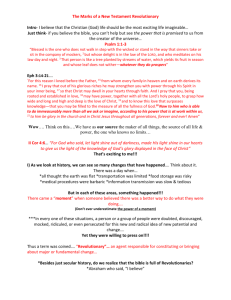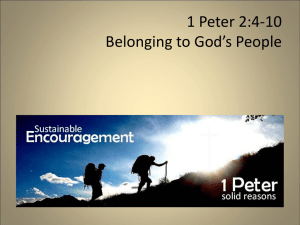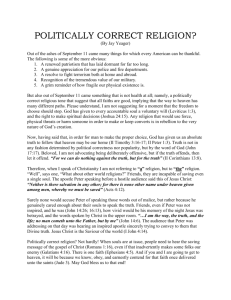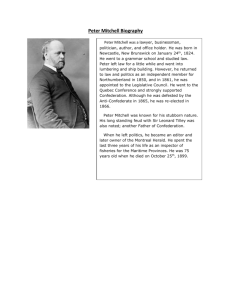1Peter_2(a)
advertisement
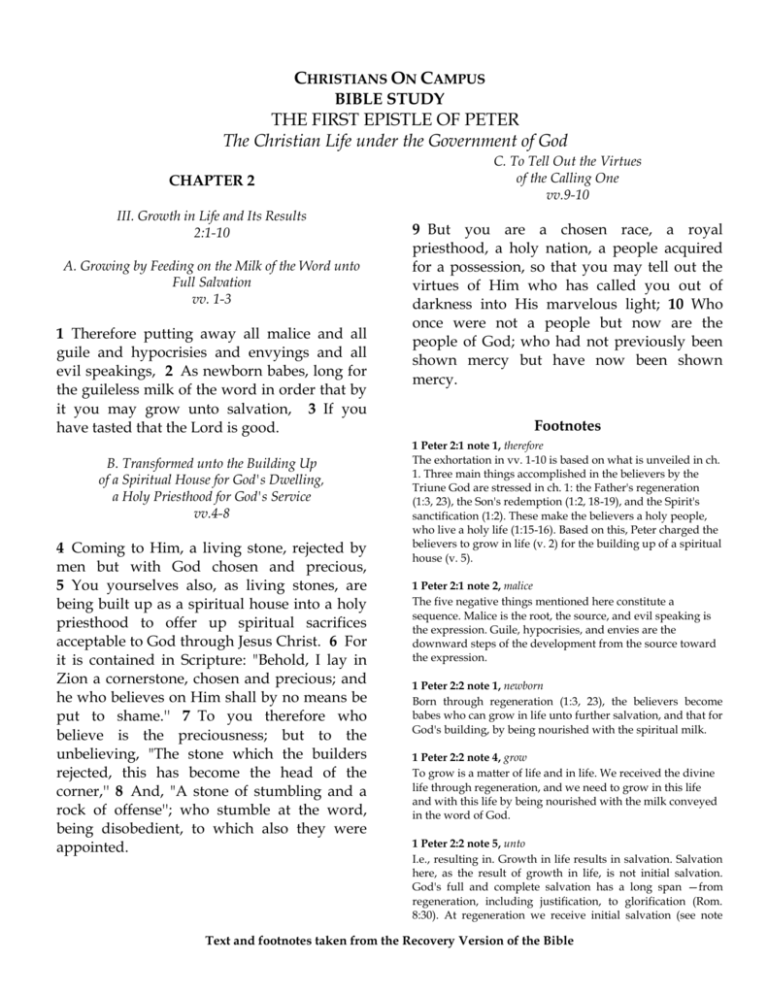
CHRISTIANS ON CAMPUS BIBLE STUDY THE FIRST EPISTLE OF PETER The Christian Life under the Government of God CHAPTER 2 III. Growth in Life and Its Results 2:1-10 A. Growing by Feeding on the Milk of the Word unto Full Salvation vv. 1-3 1 Therefore putting away all malice and all guile and hypocrisies and envyings and all evil speakings, 2 As newborn babes, long for the guileless milk of the word in order that by it you may grow unto salvation, 3 If you have tasted that the Lord is good. B. Transformed unto the Building Up of a Spiritual House for God's Dwelling, a Holy Priesthood for God's Service vv.4-8 4 Coming to Him, a living stone, rejected by men but with God chosen and precious, 5 You yourselves also, as living stones, are being built up as a spiritual house into a holy priesthood to offer up spiritual sacrifices acceptable to God through Jesus Christ. 6 For it is contained in Scripture: "Behold, I lay in Zion a cornerstone, chosen and precious; and he who believes on Him shall by no means be put to shame.'' 7 To you therefore who believe is the preciousness; but to the unbelieving, "The stone which the builders rejected, this has become the head of the corner,'' 8 And, "A stone of stumbling and a rock of offense''; who stumble at the word, being disobedient, to which also they were appointed. C. To Tell Out the Virtues of the Calling One vv.9-10 9 But you are a chosen race, a royal priesthood, a holy nation, a people acquired for a possession, so that you may tell out the virtues of Him who has called you out of darkness into His marvelous light; 10 Who once were not a people but now are the people of God; who had not previously been shown mercy but have now been shown mercy. Footnotes 1 Peter 2:1 note 1, therefore The exhortation in vv. 1-10 is based on what is unveiled in ch. 1. Three main things accomplished in the believers by the Triune God are stressed in ch. 1: the Father's regeneration (1:3, 23), the Son's redemption (1:2, 18-19), and the Spirit's sanctification (1:2). These make the believers a holy people, who live a holy life (1:15-16). Based on this, Peter charged the believers to grow in life (v. 2) for the building up of a spiritual house (v. 5). 1 Peter 2:1 note 2, malice The five negative things mentioned here constitute a sequence. Malice is the root, the source, and evil speaking is the expression. Guile, hypocrisies, and envies are the downward steps of the development from the source toward the expression. 1 Peter 2:2 note 1, newborn Born through regeneration (1:3, 23), the believers become babes who can grow in life unto further salvation, and that for God's building, by being nourished with the spiritual milk. 1 Peter 2:2 note 4, grow To grow is a matter of life and in life. We received the divine life through regeneration, and we need to grow in this life and with this life by being nourished with the milk conveyed in the word of God. 1 Peter 2:2 note 5, unto I.e., resulting in. Growth in life results in salvation. Salvation here, as the result of growth in life, is not initial salvation. God's full and complete salvation has a long span —from regeneration, including justification, to glorification (Rom. 8:30). At regeneration we receive initial salvation (see note Text and footnotes taken from the Recovery Version of the Bible 5(5) in ch. 1). Then we need to grow by feeding on Christ as the nourishing milk in the word of God, unto full salvation, unto maturity for glorification. This will be the salvation of our soul, which will be revealed to us at the revelation of the Lord Jesus (1:5 and note 5; 1:9-10, 13). However, according to the context, unto salvation here refers directly to being built up as a spiritual house into a holy priesthood to offer up spiritual sacrifices in v. 5, and to tell out the virtues of Him...in v. 9. 1 Peter 2:3 note 1, tasted The Lord can be tasted, and His taste is pleasant and good. If we have tasted Him, we will long for the nourishing milk in His word (v. 2). 1 Peter 2:4 note 1, living A living stone is one that not only possesses life but also grows in life. This is Christ for God's building. Here Peter changed his metaphor from a seed, which is of the vegetable life (1:23-24), to a stone, which is of the minerals. The seed is for life-planting; the stone is for building (v. 5). Peter's thought went on from life-planting to God's building. As life to us, Christ is the seed; for God's building, He is the stone. After receiving Him as the seed of life, we need to grow that we may experience Him as the stone living in us. Thus He will make us also living stones, transformed with His stone nature, that we may be built together with others as a spiritual house upon Him as both the foundation and the cornerstone (Isa. 28:16). 1 Peter 2:5 note 1, living We, the believers in Christ, are living stones, like Christ, through regeneration and transformation. We were created of clay (Rom. 9:21). But at regeneration we received the seed of the divine life, which by its growing in us transforms us into living stones. At Peter's conversion the Lord gave him a new name, Peter —a stone (John 1:42); and when Peter received the revelation concerning Christ, the Lord revealed further that He was the rock —a stone (Matt. 16:16-18). By these two incidents Peter received the impression that both Christ and His believers are stones for God's building. coordinated body of priests is the built-up spiritual house. Although Peter did not address his two Epistles to the church or use the term church in this verse in stressing the corporate life of the believers, he did use the terms spiritual house and holy priesthood to indicate the church life. It is not the spiritual life lived in an individualistic way, but the spiritual life lived in a corporate way, that can fulfill God's purpose and satisfy His desire. He wants a spiritual house for His dwelling, a priestly body, a priesthood, for His service. Peter's view concerning the believers' corporate service in coordination is the same as Paul's in Rom. 12. This service issues from the three vital steps in the spiritual life: being born anew (v. 2a), growing in life by being nourished with Christ (v. 2b), and being built up with the believers. 1 Peter 2:6 note 2, chosen Christ is a stone chosen by God to be the cornerstone for His building (Eph. 2:20). 1 Peter 2:7 note 1, precious In Greek, a word kindred to precious in vv. 4, 6. The very Christ chosen by God as a stone, even a cornerstone that is precious to God, is the preciousness to His believers; but to the unbelievers He is a rejected, despised stone. 1 Peter 1:9 note 1, race Race, priesthood, nation, and people are all collective nouns, referring to the believers corporately. As a race, we, the believers, are chosen; as a priesthood, a body of priests, we are royal, kingly; as a nation, we are holy; as a people, we are God's possession, a possession particularly acquired and owned by God as His treasure (Titus 2:14 and note 3). Chosen race denotes our descent from God; royal priesthood, our service to God; holy nation, our being a community for God; and people acquired for a possession, our preciousness to God. These are all in a corporate sense. Hence, we need to be built together (v. 5). 1 Peter 2:5 note 2, built up Feeding on Christ by taking in the nourishing milk in the word of God is not only for growing in life but also for building up. Growing is for building up. 1 Peter 2:5 note 6, holy Spiritual denotes the capacity of the divine life to live and grow; holy, the capacity of the divine nature to separate and sanctify. The house of God subsists mainly by the divine life; hence, it is spiritual. The priesthood subsists mainly by the divine nature; hence, it is holy. 1 Peter 2:5 note 7, priesthood The holy priesthood is the spiritual house. In the New Testament three Greek words are used in relation to the priests: hierosune, referring to the priestly office, as in Heb. 7:12; hierateia, referring to the priestly service, as in Heb. 7:5; and hierateuma, referring to the assembly of priests, a body of priests, a priesthood, as in this verse and v. 9. The Text and footnotes taken from the Recovery Version of the Bible
